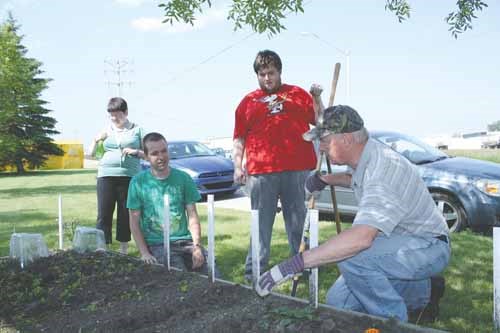A new project for the Assiniboine Food Security Alliance (AFSA) is matching property owners without gardens to gardeners without land.
"We have the community garden at the alliance Church and it's going great, it's pretty well full and probably could be expanded," said Warren Crossman. "Anyway, I've had this feeling for a while that not everybody wants to be in a community garden for whatever reason and because it was more or less full, I just thought that maybe there were some people in Yorkton here who have backyards, but don't have gardens, for whatever reason, don't want to, can't and so on, so we put a little notice in paper to match them with people who wanted to be didn't have a space."
The organization received four phone calls, conveniently two homeowners with space and two would be gardeners.
Although a modest start, Crossman is happy with the result.
"Our thinking with AFSA is that if this could get going this year, two gardens is fine, we weren't even sure if we were going to get anybody who was going to respond to this but we'll get around and we'll promote a little more for next year and I think it will just kind of I'm not sure it will take off, but if we get four people with gardens, well, now we're building community because but we've got two spaces with four people involved," he said.
Although backyard sharing is a growing phenomena in North America and Europe, Crossman said he wasn't aware of that when he came up with the Yorkton project, but rather it came out of another AFSA project called Grow and Share that has been quite successful.
"It's based on the idea that there are people in Yorkton that have fruit trees like apples or whatever and they are not going to harvest it, not going to use it, it's going to go to waste, so they would share it if there are people who can use it," he said. "It was not a big stretch to think that this matching program might work. If the program gets a little bigger, and hopefully it will, we'll have to get a little bit more sophisticated in matching."
Also new this year for AFSA is a partnership with Saskatchewan Abilities Council (SAC). The SAC approached Crossman about starting a small raised bed vegetable garden to teach its clients about growing food. In May, he went out and gave an orientation to 12 participants and the garden was born.
"it's very small, but we planted carrots and beets, tomatoes, cabbages, potatoes, radishes and also peppers," he said. "we planted quite a bit in a small space and what we've been doing is monitoring the garden and on Wednesday mornings I go over there and we talk about the garden see how it's doing and we just have a learning opportunity."
He said it has been very rewarding for him personally.
"I've found that working with these participants, they're a lot of fun, they want to learn, they want to talk, they're just a joy to behold," he said. "It's amazing and I love it."
Crossman is also hoping to bring back the Gardeners' Market later in the summer, an initiative AFSA undertook last year that he said was very popular.
All of the organization's activities are designed to promote healthy eating and relationships.
"We need all kinds of food security, but growing food locally builds community," Crossman said. "it brings people together and one of the ways we can do that is to actually have people who are consumers to find out who grows their food. Knowing that it was perhaps a neighbour or a local farmer, it will grow stronger connections with the people we live with or nearby."




